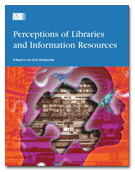 Easily noticeable on the top right of this blog, I have added a Kwintessential translation tool (admittedly, this is just a web tool and is not by any means a truly proficient way to translate this site but can help in reaching non-English web surfers). In the sidebar I have also included a link category of international library associations and other international library links. The point of all this is not just to add more ‘stuff’ to this blog for adding’s sake but rather, it is the recognition of the globalized world we now live in. Information of course plays a key role in this globalization process and so likewise, do and should libraries. Information is the business of libraries and information is now a highly valued commodity in an increasingly knowledge-based global economy.
Easily noticeable on the top right of this blog, I have added a Kwintessential translation tool (admittedly, this is just a web tool and is not by any means a truly proficient way to translate this site but can help in reaching non-English web surfers). In the sidebar I have also included a link category of international library associations and other international library links. The point of all this is not just to add more ‘stuff’ to this blog for adding’s sake but rather, it is the recognition of the globalized world we now live in. Information of course plays a key role in this globalization process and so likewise, do and should libraries. Information is the business of libraries and information is now a highly valued commodity in an increasingly knowledge-based global economy.  fect market. Not perfect in the sense that 'all is well' but that there is more known about all the participants in the market, more known about producers and consumers, with each in either sector also knowing more about each other. Undoubtedly, there is still a digital divide but most of the world now benefits from knowing more now about people, places and events in other parts of the world. This is a sort of equalizing or flattening process, as with the term used and thesis posited by Tom Friedman in his book The World is Flat.
fect market. Not perfect in the sense that 'all is well' but that there is more known about all the participants in the market, more known about producers and consumers, with each in either sector also knowing more about each other. Undoubtedly, there is still a digital divide but most of the world now benefits from knowing more now about people, places and events in other parts of the world. This is a sort of equalizing or flattening process, as with the term used and thesis posited by Tom Friedman in his book The World is Flat. Such increased knowledge results in individuals and entities having to distinguish themselves all the more: to stand out and be noticed. And so indeed, is the case with libraries, where with online databases and directories, they, like other institutions putting content on the Web, can have clientele that can be from anywhere in the world and not just within the same country. Yet with the Web and so much information available from it, over the years many have wondered about the relevance of libraries and whether such relevance is on the wane with the Internet's inexorable growth. Apart from scholarly articles, a check with the blogosphere reveal a number of posts on this topic within recent years as well.

It is with some of such concerns that the OCLC (Online Computer Library Center) undertook its 2003 OCLC Environmental Scan: Pattern Recognition report. In the report there was the concern that there was:

However the OCLC went on to undertake another report Perceptions of Libraries and Information Resources, published in 2005. This other report emerged as despite all the studies and reports that the Scan provided:
"few of these resources emanated from the part of the infosphere that OCLC and libraries inhabit and there are no major recent empirical studies that look specifically and broadly at the role libraries and librarians play in the infosphere, from the point-of-view of the information consumer. How are libraries perceived by today’s information consumer? Do libraries still matter? On what level? Will library use likely increase or decrease in the future?"
And so in commissioning the new report the OCLC:
Some of the findings of the report:
84% of respondents begin an information search with a search engine; 1% with a library Web site.
Search engines are rated higher than librarians.
Library card holders are more disposed favorably to libraries than non-card holders.
'Books' is the Library brand: no runner-up.
Most information users are not aware of nor do they use most libraries' electronic information resources.
Search engines fit the information consumer's lifestyle better than physical or online libraries.
Aside from public support, perhaps nothing gains the attention of policy makers more than an ROI (Retu rn of Investment) perspective as well as how people can better interact with the very service which the federal government provides. In the ALA's (American Library Association) report, The State of America's Libraries issued in April this year, an FSU (Florida State University) study found that:
rn of Investment) perspective as well as how people can better interact with the very service which the federal government provides. In the ALA's (American Library Association) report, The State of America's Libraries issued in April this year, an FSU (Florida State University) study found that:
With respect to ROI or economic returns, the study also reports in Florida, it was also found that:
Post Addendum
I discoverd this book after writing this post and thought it would be remiss of me to not at least make mention of it in relation to this article.
Global Librarianship, by Martin A. Kesselman and Irwin Weintraub, Marcel Dekker Inc. 2004.
Book Description: Providing new insights into the role of librarianship in an age of socioeconomic, environmental, and political transformation, Global Librarianship illustrates how globally networked environments promote and increase the sharing and dissemination of ideas, information, and solutions to obstacles affecting libraries. This reference showcases methods to tailor and build collections and technologies that continually support worldwide scholarly and business communities through the utilization of digital tools and electronic media. It Illustrates breakthroughs in the organization, management, and dissemination of information to facilitate easy access to libraries anywhere in the world.








